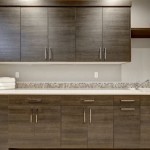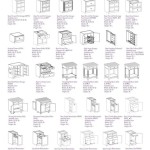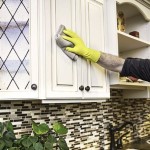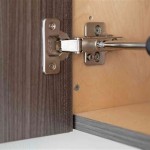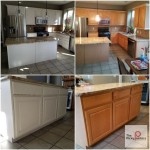How to Clean Very Greasy Kitchen Cabinets: Essential Aspects
Maintaining a clean kitchen is essential for hygiene and comfort. Dealing with greasy kitchen cabinets, a common problem, can be frustrating. However, with the right approach and effective cleaning methods, it's possible to restore their original shine.
The key to effective cabinet cleaning lies in understanding the nature of grease and its interaction with different cleaning agents and materials. The following paragraphs will delve into the essential aspects of cleaning greasy kitchen cabinets, providing practical tips and detailing the best practices for achieving a spotless surface.
Understanding the Nature of Grease
Grease is a complex substance composed primarily of fats and oils. It can vary in consistency, from liquid to solid, depending on its source and temperature. When grease accumulates on kitchen cabinets, it forms a sticky film that attracts dirt and grime, creating an unsightly and unsanitary surface.
To effectively remove grease, it's important to use cleaning agents that can dissolve or break down the fatty components. Dish soap, degreasers, and specialized cleaning products formulated for grease removal are suitable options.
Choosing the Right Cleaning Agents
The choice of cleaning agents depends on the type of cabinets and the severity of the grease buildup. For regular cleaning, dish soap diluted in warm water is often sufficient. However, for heavily greasy surfaces, stronger degreasers may be necessary.
When choosing a degreaser, it's important to read the product label carefully and follow the instructions for use. Some degreasers may be corrosive and should be handled with caution. It's also advisable to test the degreaser on an inconspicuous area before applying it to the entire cabinet.
Cleaning Materials and Techniques
The choice of cleaning materials and techniques is crucial for effective grease removal. Soft cloths, sponges, and microfiber cloths are recommended as they are less likely to scratch or damage the cabinet surfaces.
When cleaning, it's important to work in sections and avoid spreading the grease around. Apply the cleaning solution to a small area, work in circular motions, and rinse thoroughly with clean water. For stubborn grease, a gentle scrubbing brush may be necessary.
Preventing Grease Buildup
Regular cleaning is essential for preventing grease buildup, but there are additional measures that can help reduce its accumulation:
- Use a range hood or exhaust fan during cooking to minimize grease dispersal.
- Wipe down cabinet surfaces regularly with a damp cloth to remove any grease splatters.
- Store greasy cookware and utensils in separate containers to prevent grease from spreading to other surfaces.
Conclusion
Cleaning very greasy kitchen cabinets requires a systematic approach that involves understanding the nature of grease, choosing the right cleaning agents and materials, and employing effective cleaning techniques. By following the essential aspects outlined in this article, you can effectively remove grease buildup, restore the shine of your kitchen cabinets, and maintain a clean and hygienic cooking environment.

How To Remove Grease From Kitchen Cabinets 3 Methods Bob Vila

How To Clean Kitchen Cabinets Everyday Skate

How To Clean Sticky Grease Off Kitchen Cabinets Ovenclean

Get Grease Off Kitchen Cabinets Easy And Naturally

Best 4 Ways To Clean Greasy Kitchen Cabinets Rosene Toronto On

Degrease Kitchen Cabinets With An All Natural Homemade Cleaner

Get Grease Off Kitchen Cabinets Easy And Naturally

Best Ways To Clean Grease Stains Off Kitchen Cabinets

How To Clean Grimy Kitchen Cabinets With 2 Ingredients

Clean Kitchen Cabinets Off With These Tips And Hints
Related Posts

